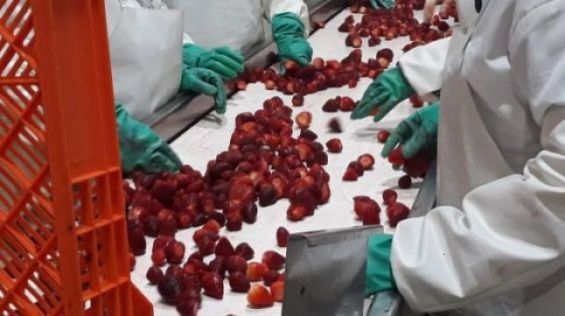What if the preventive measures and social distancing precautions some of us take were not enough to avoid the spread of the novel coronavirus? According to a new study on one of the superspreading coronavirus outbreaks in Germany, interventions or measures intended to prevent the spread of the virus can be affected by the environments where they are implemented.
Investigating the events behind a SARS-CoV-2 outbreak in the largest meat-processing complex in Germany, the study reveals that «climate conditions and airflow» are factors that can «promote efficient spread of SARS-CoV-2».
Analyzing the working conditions of the meat-processing workers, the paper further explains that «factors such as temperature, humidity and air circulation are thought to significantly influence stability and transport of droplets and aerosols and consequently transmission efficiency», especially in plants.
Referring to the German meat-processing plant, the authors of the study indicate that the rapid spread of the virus within factories can also be linked to the lifestyle of workers, including the «sharing of housing and transportation».
«Close proximity of workers in the production line combined with physically-demanding work that promotes heavy breathing» can also lead to rapid infections within plants.
Furthermore, the nature of the productions of these plants is also related to the possible outbreaks. «Requirements to operate at low temperature in an environment with low air exchange rates is another factor that may promote spread of the virus among workers», the study unveiled.
Preventing transmission
These findings suggest that «a physical distance of 2 meters does not suffice to prevent transmission in environmental conditions such as those studied», the study reports. According to its authors, «additional measures such as improved ventilation and airflow, installation of filtering devices or use of high-quality face masks are required to reduce the infection risk in these environments».
In addition to the meat-processing plant outbreak, the study also focused on other infections that occurred in the German meat industry. «Our findings suggest that the facilities’ environmental conditions, including low temperature, low air exchange rates, and constant air re-circularization, together with relatively close distance between workers and demanding physical work, created an unfavorable mix of factors promoting efficient aerosol transmission of SARS-CoV-2 particles», it explained.
«The recurrent emergence of such outbreaks suggests that employees in meat or fish processing facilities need to be frequently and systematically screened to prevent future SARS-CoV-2 outbreaks».
The same precaution scan be applied in Morocco, where several coronavirus outbreaks have occurred in plants, with large numbers of infections. The facilities housed high amounts of workers who worked in fruit and fish packaging. With similar working conditions, the virus spread rapidly within these facilities, with hundreds of workers testing positive for the coronavirus.
In Lalla Mimouna only, a location with several fruit packaging factiories, hundreds of workers tested positive for the coronavirus. To avoid similar scenarios, the study suggests that «immediate action needs to be taken to quarantine all workers in a radius around an infected individual that may significantly extend beyond 2m».





 chargement...
chargement...












